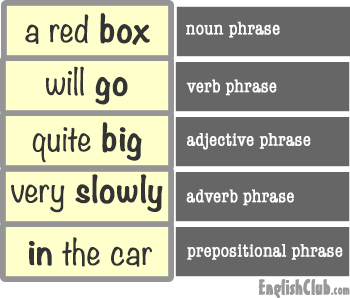Phrases

A phrase is one or more words that form a meaningful grammatical unit within a clause. There are five main types of phrase in English, as below.
Noun Phrase
A noun phrase (NP) can be a single noun or a group of words built around a single noun, for example:
- Animals need water.
- Who ate the last sandwich?
- All passengers with tickets can board now.
Verb Phrase
A verb phrase (VP, also called a "verb group") consists of a main verb and its auxiliary verbs (including modals), for example:
- We have been working since 9am.
- I will be going to France next week.
- It may have been being repaired.
Adjective Phrase
An adjective phrase can be a single adjective or a group of words built around a single adjective, for example:
- He has clever ideas.
- It was a very big meal.
- The students were really bored with the film.
Adverb Phrase
An adverb phrase can be a single adverb or a group of words built around a single adverb, for example:
- Please do it now.
- He spoke very softly.
- They did it as fast as possible.
Prepositional Phrase
A prepositional phrase consists of a preposition followed by its object (usually a noun phrase), for example:
- They were arguing about money.
- The window was behind a large brown sofa.
- They resumed after an unusually large meal.
The table below shows all five phrase types used in a single clause:
| he | is jumping | over | the | very lazy | dog | as fast as possible |
| NP | VP | PrepP | AdvP | |||
| NP | ||||||
| AdjP | | |||||

